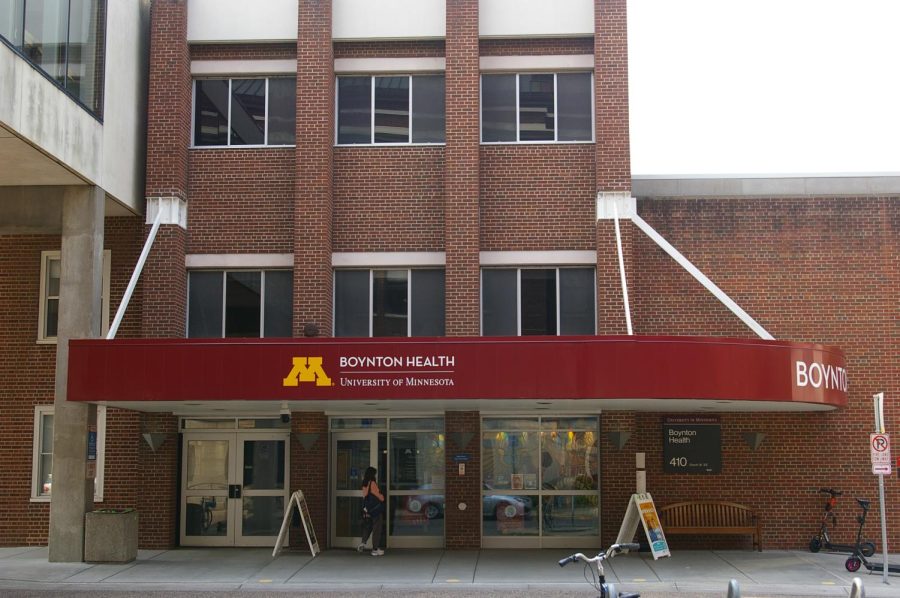As students return to campus, the University of Minnesota is continuing outreach efforts and testing to combat the spread of monkeypox in the campus community that began this past summer, including offering frequent communication about vaccination and treatment options to students.
“Outreach, education and vaccination efforts are currently focused on meeting the needs of those at risk of exposure,” Jake Ricker, director of public relations at the University, said in an email to The Minnesota Daily.
According to the Minnesota Department of Health (MDH), monkeypox is a viral disease that is caused through skin-to-skin contact between individuals, contact with contaminated objects such as bedding and clothing and respirator particles transmitted between people. Individuals with monkeypox might experience flu-like symptoms and a rash or skin lesions, which can persist for up to four weeks without treatment.
As of Tuesday, 173 cases of monkeypox have been confirmed in Minnesota since June, according to the MDH.
The University has also been collaborating with the MDH to review access to vaccines as they became available and has provided guidance to the other system campuses about testing, vaccination and educational outreach.
“We ensured readiness to support members of our community in complying with MDH and Centers for Disease Control and Prevention (CDC) guidelines such as those for isolation while sick with monkeypox,” Ricker said in the email statement.
The University’s Boynton Health is also now administrating monkeypox tests. A student should only be tested for monkeypox if a rash appears, according to Ricker. If a student suspects that they have monkeypox, they are encouraged to contact Boynton to discuss testing options.
While monkeypox has existed in other parts of the world for about 50 years, the first case was identified in the U.S. in May. According to Roli Dwivedi, the chief clinical officer at the Community-University Health Care Center, because of its novelty, scientists remain unsure about how to classify the virus.
“It is still said that it is transmitted through the bodily fluids or the skin lesions, but it is not identified as an STD,” Dwivedi said
Monkeypox infections disproportionately affect men who have sex with men, but the disease can infect any individual regardless of gender and sexual orientation, according to a study of the virus’ spread.
Some of the groups University officials have worked with to build awareness on campus include Pride @ Work, an LGBTQIA+ affinity group, Housing and Residential Life and the Gender and Sexuality Center, according to Ricker.
Their outreach efforts involve sharing resources about prevention strategies and vaccine information, which has been an ongoing effort since the start of the summer, according to Ricker.
Dr. Lauren Fontana, an assistant professor and infectious diseases physician at M Health Fairview, said students should take preventative measures to avoid being exposed to the virus, despite a downward trend of cases in Minnesota and across the U.S.
Fontana suggested students follow standard hygiene practices to prevent themselves from the disease, such as washing their hands often and using alcohol-based hand sanitizer. However, she said the odds of catching the disease from contact with surfaces is “extremely low.”
“Early detection of a monkeypox infection is important to prevent the spread of
infection to others,” Fontana said. “In general, monkeypox is not as contagious as COVID.”
For more information about monkeypox, Boynton Health compiled a Q&A about the disease on their website. The University’s Center for Infectious Disease Research and Policy has also published the Monkeypox Resource Center page, which features the latest news about monkeypox.




















lostoncampus
Sep 22, 2022 at 2:41 pm
“According to the Minnesota Department of
Health (MDH), monkeypox is a viral disease that is caused through
skin-to-skin contact between individuals, contact with contaminated
objects such as bedding and clothing and respirator particles
transmitted between people.”
Actually, the main cause of spread isnt even mentioned. . . . great “news” story.